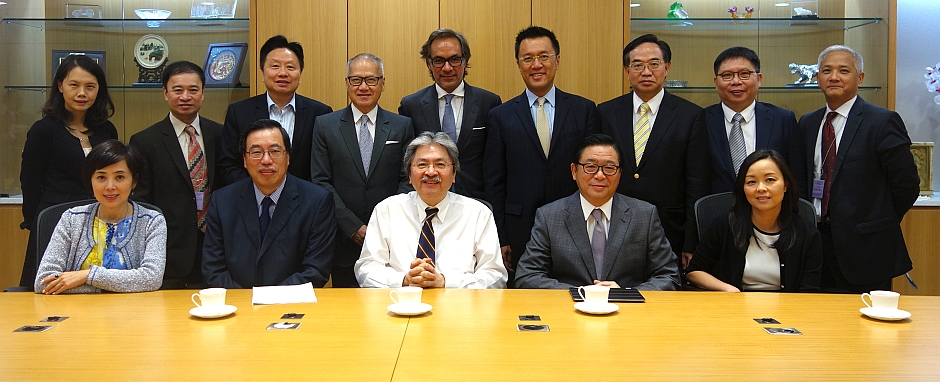
Back row from left: Ms Linda Choi, Vice President (Public Affairs) of Hong Kong Disneyland; Mr Ken Chan Wing-on, President of the Hong Kong Federation of Restaurants and Related Trades; Dr Jimmy Tang, Chairman of Prince Jewellery and Watch Company; Dr Simon Kwok Siu-ming, Chairman of Sa Sa International Holdings; Dr Aron H Harilela, Vice-Chairman of the Hong Kong General Chamber of Commerce; Mr Philip Ma, Deputy Chairman and Chief Executive Officer of the Sincere Group; Dr Lo Wai-kwok, BPA Vice-Chairman; Mr Michael Wu, Chairman of the Travel Industry Council of Hong Kong; and Mr Victor Chan, Chairman of the Hong Kong Hotels Association.
The Government has recently mooted the possibility of scaling back the Individual Visit Scheme (IVS), which has given rise to grave concerns within the business community in particular those from the retail and tourism trades. The proposal comes at a bad time as first quarter retail sales figures released recently showed the sharpest year-on-year fall in Hong Kong’s retail sales. Today (June 16), representatives from the Business and Professionals Alliance for Hong Kong (BPA) and other sectors met with the Financial Secretary, Mr John Tsang Chun-wah, to deliver a clear message: Hong Kong’s economy would sustain serious damage if restrictions were imposed on the number of IVS visitors from the Mainland. The BPA urged Mr Tsang to give careful consideration to the potential knock-on effects to the broader economy before going ahead with any policy changes.

During the meeting with the Financial Secretary, Mr Andrew Leung Kwan-yuen, BPA Chairman, Mr Jeffrey Lam Kin-fung and Dr Lo Wai-kwok, BPA Vice-Chairmen, as well as representatives from the travel and tourism, retail and catering, shipping and transport, leisure and hospitality trades, expressed in unequivocal terms their opposition to any form of measures to reduce IVS visitors.
“Tourism is one of Hong Kong’s four economic pillars. If the volume of IVS traffic were to decrease by 20% this would have a huge disruptive impact on our economy. Workers from the lower and the middle class would bear the brunt as companies downsize and cut jobs. Reducing IVS would be imprudent!” Mr Leung said after meeting with the Financial Secretary. He said that the BPA was fully aware of the inconvenience to locals typically in districts where there was a high concentration of tourists. However, he did not agree with the Government’s broad brush approach to addressing the issue. Instead, it should seek to strike a balance by taking into account the interests of all stakeholders, and to conduct reviews for enhancing tourism facilities and capacity.
The BPA’s views and suggestions were widely supported by other sectoral representatives who urged the Government to take these into consideration. Dr Simon Kwok Siu-ming, Chairman of Sa Sa International Holdings, noted that the rate of growth in Mainland visitor arrivals in April had slowed to 14.7 percent and was therefore concerned that a tightening of the IVS would further undermine an already fragile retail market. Ms Cindy Yeung, Chairman of Emperor Watch and Jewellery, said that retail staff have generally seen a decline in income. A further deterioration in retail sales could lead to redundancies, an outcome we want to avoid at all cost. Dr Jimmy Tang, Chairman of Prince Jewellery and Watch Company, referred to the sporadic cases of tourist harassment and said that in a civilized society visitors would not be made to feel unwelcome or alienated. Furthermore, people in Hong Kong and on the Mainland share a common cultural heritage.

“Many retail goods, especially luxury products, are often shipped by air to Hong Kong,” explained Ms Chitty Cheung, Director of Corporate Affairs at Cathay Pacific. A contraction in the retail industry would therefore have dire consequences on Hong Kong’s aviation industry. As such, it was imperative that the disruptive effects of any Government solution should be as minimal as possible. Mr Philip Ma, Deputy Chairman and Chief Executive Officer of the Sincere Group, said it was a common misperception that any fallout from a curtailment of IVS would be limited to the retail and tourism industries. In reality, wholesalers and other businesses in the retail supply chain would also suffer as a result. Mr Ken Chan Wing-on, President of the Hong Kong Federation of Restaurants and Related Trades, related that restaurants in popular tourist spots were already reporting a fall in business receipts. He called on the Government to refrain from meddling in Hong Kong’s free market economy.
Ms Linda Choi, Vice President (Public Affairs) of Hong Kong Disneyland, felt that priority should be given to enhancing Hong Kong’s attractiveness as a tourist destination when neighbouring jurisdictions such as Japan and Singapore were competing more intensely for overseas visitors. Mr Michael Wu, Chairman of the Travel Industry Council of Hong Kong, pointed out that “Occupy Central” would deter visitors from coming to Hong Kong. He also referred to the recent violent protests at the Legislative Council, and said that these had, to some extent, tarnished Hong Kong’s standing and reputation as a premier travel destination. He appealed for cooler heads henceforth whenever the right to express opinions publicly was exercised.
Mr Lam said a number of constructive proposals had been put forth during the meeting with Mr Tsang. These included fast tracking the completion of new and improvement projects such as the third airport runway, as well as the creation of additional tourist and shopping attractions. These would be beneficial to enhancing Hong Kong’s tourism capacity and help create further employment opportunities. Mr Lam also pointed out that the business community was worried about the negative consequences of “Occupy Central” and hoped that Hong Kong would continue to offer a stable and secure operating environment.
Mr Lam said that Mr Tsang had appealed to the business community to be more active in providing input as their views were very important to the policy formulation process. Mr Tsang also appreciated the importance of IVS to Hong Kong’s economic well-being.

 Follow
Follow